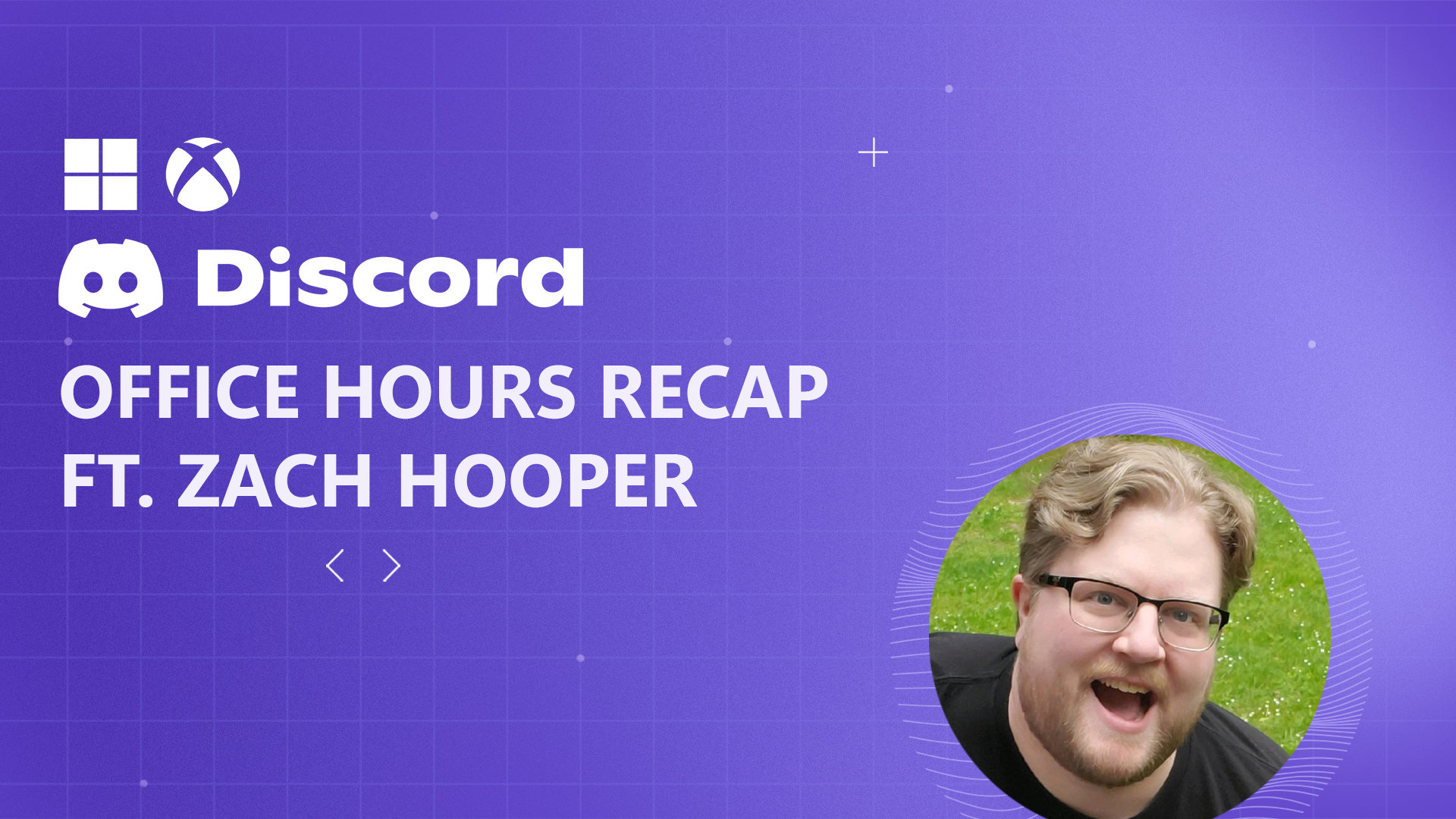Office Hours Recap - Zach Hooper
We invited Zach Hooper, a Principal Product Manager at Xbox, to join us on Discord to tell his story and answer our community questions about his work.

Game dev can be hard. There’s a lot to learn, social networks to build, and always new problems to solve. Microsoft wants as many game developers to succeed as possible, and we want to help you on your journey. That’s why, every Friday morning at 11:00 AM Pacific, we invite the game development community to join us on our official Discord for Office Hours.
By creating an open and welcoming community space, one where you can make connections with real industry professionals and ask questions about the issues that are most important to you, we’re making more resources accessible to developers of all sizes from across the globe.
Each week, we invite an experienced game developer to join us, tell their story, and answer any questions you might have about their work. If you’d like to keep up with who will be joining us and what topic we’ll be covering, join our Discord server and keep an eye on the #announcements channel for calendar updates!
On Friday, July 18, we invited Zach Hooper, a Principal Product Manager at Xbox, to join us and talk about his long history in the industry. From Quality Assurance to Engineering to Production, Zach has seen nearly every part of the production pipeline from beginning to end. Zach has spent time at studios such as Surreal Software, Monolith Productions, Turn 10 Studios, and Battle Barge, and he covered a lot of valuable industry insights that reflect his vast and varied experiences.
In his current role, Zach focuses on the developer relationship with middleware and how to make your ability to publish on Xbox easy to do regardless of your choice in game engines. His insight into the game engine landscape is invaluable and what we’d like to highlight today.
The Importance of Choosing Your Engine
Zach broke down the classes of game engines into two categories: licensed and custom built.
Licensed game engines offer ready-made systems for graphics, physics, and audio components, allowing studios and developers to focus their production efforts on making a great game rather than spending time developing their tools. This can be ideal for smaller studios or independent single developers who have a limited amount of bandwidth for the project they’re developing. This category includes engines like Unity, Unreal Engine, RPGMaker, GameMaker, Godot, and more.
Custom engines are much more common with AAA game development or when the game being developed has specific, unique experiences that demand special tools. Because these kinds of games are prolific with larger studios that often have more resources and larger marketing reach, they represent some of the highest numbers of units sold in reports like VG Insight’s Big Game Engines Report (2025).
When you’re deciding on what engine is going to best suit your development needs, consider your personal bandwidth, the resources you (or your team) have available, and the specific demands of the game you plan on making. If a licensed engine can fulfill your needs, it may be worth losing access to some customization and potentially paying a licensing fee over spending time you don’t have building your own tools.
Leveraging the Microsoft Game Development Kit (GDK)
Once you’ve decided on your engine and you’re considering publishing on Xbox, make sure to look through the resources we offer through the GDK. There are a wealth of examples available for free on GitHub that you can use to get a head start on your project, especially if you’re planning on using a supported licensed engine.
- GDK Learn Articles
- Getting access to GDK for Xbox Series X|S Consoles with specific licensed engines
- Custom C/C++ Engine Integration
- Unity Integration
- Unreal Integration
- GameMaker Integration
- Godot & Console Porting
- Note: As an open-source engine, Godot does not have direct porting to console; they have partners for console-porting programs
If there’s a licensed engine you want to use that doesn’t currently have examples or documentation for GDK integration, we want to know about it! Our teams are constantly working to provide more resources to make game development on Xbox easier for everyone, but we need to know what tools or engines you find most helpful to guide our content plans. You can always head to our Discord and leave us your feedback if you have a particular tool or platform in mind.
Q&A
At the end of each Office Hours session, we open the floor for a full Q&A. Below are a few highlights straight from our community and be sure to join us next time if you have a question you want to ask!
About Zach
Q: How was your experience going from Quality Assurance (QA) into other jobs in the industry? Is it a required step to get started?
A: QA was a natural place for me to start because I’m always looking to learn how things work in games and often break them as a result. Many people look at QA as a steppingstone, but there is also a lot of value and skills you can build by being an effective QA tester. There are admittedly some challenges with career growth and longevity in QA, so make sure to prioritize what’s most important to your end goals.
Production was a natural transition for me; they’re two sides of the same coin. QA is the depth of the ocean and looking for targeted but important problems to fix, while being a Producer requires being in the air like a plane, 15,000 feet up and steering a team in the right direction by looking at the bigger picture.
Q: What other kinds of questions are best to ask someone like you at Xbox?
A: I love to hear more about what kind of engines, coding languages, and other middleware you want to use as a developer. Communicate your needs to us! It helps guide the kind of work I do to give you better tools for your development pipeline.
GDK and Publishing Questions
Q: Will Xbox’s evolving multi-device and platform strategy affect people who use custom tech? How much can we expect to be handled by the GDK versus additional, manual work being needed?
A: While we can’t speak to future platforms right now, the GDK is intended to be the core for building games for Xbox regardless of Xbox store endpoint. However, any custom system will still require some manual integration work depending on your personal needs.
Q: Right now, the GDK is deployed as an alternative build mode that isn’t required for non-GDK platforms. Are there any plans for interoperability with existing libraries so that two separate code paths aren’t needed to run on both GDK-based and non-GDK-based systems?
A: We want to make the slice of what’s GDK-specific when building for Windows smaller so only the minimums to use our store front are required. However, we have no specific plans to share at this time.
Q: How much of the GDK is really required to publish on Xbox? Do I need to use all its features and functionality to pass certification?
A: No! The GDK and templates provided in Visual Studio include basic feature support as well as additional tools that aren’t necessary, but that you may find helpful or will save overall development time (such as PIX for performance).
However, the GDK does include three essential items you should pay special attention to when looking to pass certification and fulfill our terms of service:
- The configuration file (MicrosoftGame.config) provides a lot of information about your game and what you’re enabling/disabling within your product.
- The Xbox services APIs (XSAPI) and Gaming Runtime (GRTS). These are needed to build an Xbox game and pass certification. They enable features like Achievements, Leaderboards, and Cloud saves.
- Microsoft Packaging tools for prepping your final builds to submit to Microsoft Partner Center.
Make sure to review the terms of service and certification requirements to identify what will be most important for your project.
General Questions
Q: What direction do you see the gaming industry heading in and are there any specific skills or tools in demand?
A: Technical skills are in high demand regardless of what your focus is. For example, as an artist, make sure you have the skills to pivot to technical art as it will broaden the opportunities available to you.
Knowing how to code, script, and blend your skills regardless of discipline (as a programmer, writer, or artist, for example) will open more doors for you and give you the edge over other candidates.
Q: Do you have advice for entering the industry?
A: When it comes to your core skills, make sure you can demonstrate them. Have a portfolio and always keep building and demonstrating your capabilities. If you can speak to your process when solving a problem, that context of how you think will stand out when a hiring manager is evaluating your application.
Your network is important. It doesn’t just have to be your friends; it can include people you’ve met at game jams, conferences, local industry groups, or even this Discord! Always keep meeting and talking to people, as it’ll broaden your exposure to new opportunities.
Q: How can indie developers get good quality-based testing for their game?
A: For quality-based testing, there are two avenues as an indie:
- Word of mouth; connect with other developers or players via communities like Reddit or Discord. Consider trading testing time with other developers. Make sure to use a preview build.
- Have some kind of form or email dedicated to feedback and make sure it is clearly communicated!
- Testing Services from different companies. Without name-dropping, shop around. There will be a cost involved, but it will be more affordable as an option, especially if you’re a small developer. Compare what services they offer and make sure you find the right level for your game’s needs.

